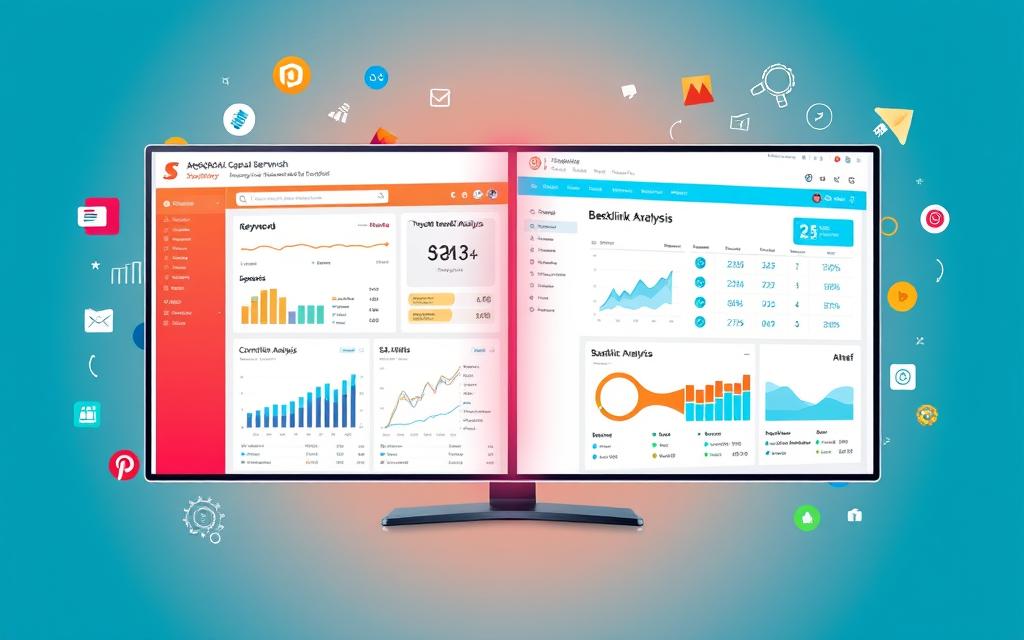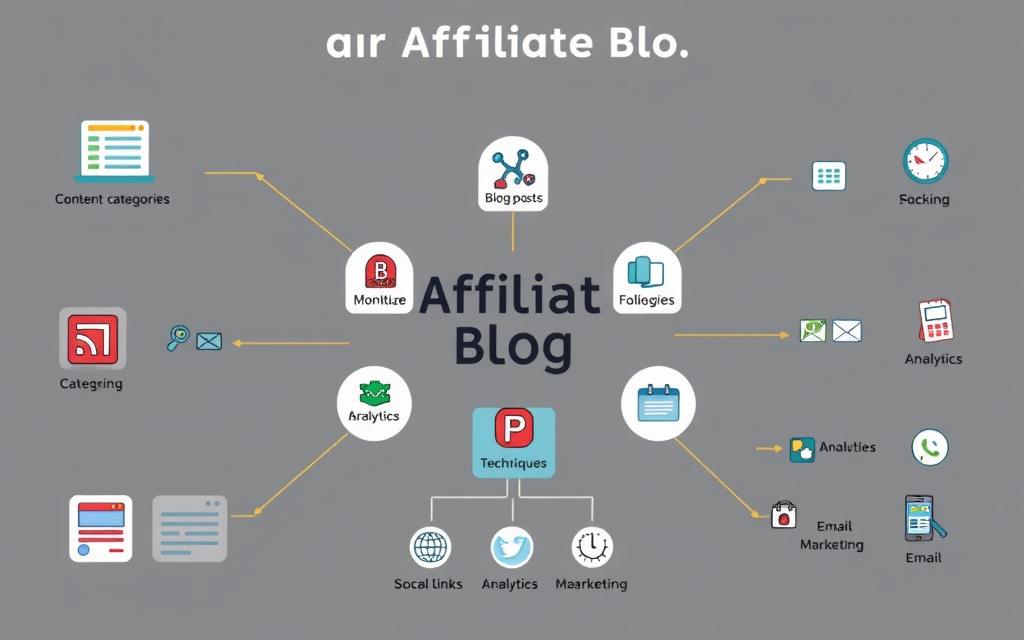In the world of affiliate marketing, the right tools are crucial for success. Whether you’re new or looking to improve, this guide will show you the key tools and strategies. They can make your workflow smoother, increase productivity, and boost your earnings.
But, are you using your affiliate blog to its full potential? This article will cover the must-have tools and methods for affiliate marketers. We’ll look at niche research, website building, data analytics, and community engagement.
Key Takeaways
- Discover the essential tools for managing a successful affiliate blog
- Learn how to choose the right niche and build a user-friendly website
- Explore top-notch keyword research, content management, and email marketing solutions
- Understand the importance of social media, analytics, and affiliate marketing plugins
- Tap into the power of community and support resources to accelerate your growth
1. Understanding Affiliate Blogging
Affiliate blogging is a way for content creators to make money by promoting products. They use affiliate marketing software to do this. They create valuable content and add affiliate links to it. This way, they earn a percentage of the sales made through their links.
What is Affiliate Blogging?
Affiliate blogging means building a blog and promoting products or services. When someone clicks on your link and buys something, you get a commission. This can be a big help for bloggers, letting them make money from their content.
Benefits of Affiliate Blogging
- Passive Income Potential: You can earn commissions on sales, even when you’re not working on your blog.
- Flexible Content Creation: You can write about what you love, without being tied to specific products.
- Low Startup Costs: Starting an affiliate blog is cheaper than traditional e-commerce, making it easier for bloggers.
- Scalability: As your blog grows, so can your earnings from affiliate marketing, leading to more money over time.
By learning about affiliate blogging and using the right affiliate marketing software and monetization techniques, you can make your blog successful and profitable in the long run.
2. Choosing the Right Niche
Finding the right niche is key to success in affiliate blogging. You need to do thorough market research and look at the competition. This helps you pick a niche that will last and do well.
Researching Profitable Niches
Look for niches that people are interested in and willing to spend money on. Choose areas with a big audience and lots of search volume. Content optimization and SEO strategies can help you find these good opportunities.
- Analyze Google Trends data to identify emerging trends and popular search queries
- Explore online marketplaces like Amazon to gauge the demand for products within a niche
- Leverage keyword research tools to uncover high-volume, low-competition keywords
Long-term Viability of a Niche
Even if a niche seems profitable at first, think about its long-term future. Look at the competition, how easy it is to get started, and if it can keep growing. This ensures you pick a niche that will keep bringing in money for a long time.
| Factors to Consider | Potential Impact on Niche Viability |
|---|---|
| Competitive Landscape | Highly competitive niches may be challenging to break into and maintain a presence, while low-competition niches offer more opportunities for growth. |
| Product/Service Diversification | Niches with a wide range of products or services tend to be more resilient to market changes and offer more affiliate marketing opportunities. |
| Emerging Trends and Technologies | Staying ahead of industry trends and adapting to new technologies can help future-proof your niche and keep it relevant over the long term. |
By doing deep research on niches and thinking about their long-term future, you can find a good and lasting affiliate blogging opportunity. This opportunity should match your interests and what you’re good at.
3. Essential Hosting Services
Reliable hosting is key for any successful affiliate blog. Many top providers offer different features and benefits. We’ll look at some of the best hosting options to help you choose the right one for your blog.
Comparing Web Hosting Providers
Bluehost is a well-known and widely used hosting provider. It’s known for its easy-to-use interface and strong features. SiteGround is also popular, offering great customer support and uptime, perfect for affiliate bloggers.
HostGator is another top choice. It’s known for its scalable solutions and flexible pricing. This makes it great for bloggers with different needs.
Features to Consider in Hosting
When picking a hosting provider, consider a few key features:
- Uptime Guarantee: Make sure your provider guarantees high uptime. This keeps your blog up and running for your audience.
- Storage Capacity: Pick a plan with enough storage for your blog’s growth.
- Customer Support: Good customer support is crucial for solving problems and getting help.
| Hosting Provider | Uptime Guarantee | Storage Capacity | Customer Support |
|---|---|---|---|
| Bluehost | 99.9% | 50 GB – Unlimited | 24/7 Support |
| SiteGround | 99.9% | 10 GB – 30 GB | 24/7 Support |
| HostGator | 99.9% | Unlimited | 24/7 Support |
By looking at these important features, you can find the best hosting for your affiliate blog.
4. User-Friendly Website Builders
Choosing the right website builder is key for an affiliate blog. WordPress and Wix are two popular options. Each has its own strengths and weaknesses for affiliate marketers.
WordPress vs. Other Platforms
WordPress is a top pick for bloggers and affiliate marketers. It has a huge plugin library and lots of customization options. This lets users add features like e-commerce and SEO tools.
On the other hand, Wix and Squarespace are known for their easy-to-use drag-and-drop interfaces. They’re great for those who aren’t tech-savvy.
Customization Options
- WordPress lets users change their site’s design, layout, and features with themes and plugins.
- Wix and Squarespace have more limited customization options. This is because they focus on being easy to use.
- Weebly and Jimdo offer a balance. They’re easy to use but still let users customize their sites.
The right website builder depends on your tech skills, site complexity, and control needs. By comparing features, you can pick the best platform for your affiliate blog.

“The right website builder can make all the difference in creating an engaging and functional affiliate blog.”
5. Keyword Research Tools
Keyword research is key in SEO strategies. It helps drive organic traffic to your affiliate blog. By knowing what your audience searches for, you can make your content more visible. This means more people can find your blog, leading to more potential customers.
The Importance of SEO
SEO, or search engine optimization, makes your website easier to find. Good SEO strategies can increase your blog’s visibility. This leads to more readers and potential sales.
Top Keyword Research Tools to Use
To find the best keywords for your blog, use these top tools:
- SEMrush – Gives detailed data on search volume, competition, and trends. It helps you find the best keywords for content optimization.
- Ahrefs – Offers deep insights into keyword difficulty, traffic potential, and related keywords. It guides your content strategy.
- Google Keyword Planner – A free tool from Google. It lets you research search volume, competition, and cost-per-click. This helps you choose the right keywords.
Using these tools helps you understand your audience’s search habits. You can then create content that meets their needs. This drives more traffic and potential sales to your blog.
6. Content Management Systems
Running an affiliate blog needs a strong content management system (CMS). It helps you publish content smoothly and make it more effective. The right CMS is key to managing your blog well and keeping your content in order.
Managing Your Blog Effectively
A good CMS should be easy to use. It should have features like:
- Intuitive post and page creation
- Seamless media uploads and management
- Powerful content content optimization editing tools
- Customizable templates and themes
- Analytical insights into your blog’s performance
With the right CMS, you can focus on making great content. The system will take care of the technical stuff.
Popular Content Management Options
For affiliate blogs, three top CMS choices are:
| CMS | Key Features | Ease of Use | Customization |
|---|---|---|---|
| WordPress | – Vast plugin ecosystem – Extensive theme library – SEO-friendly by default |
Very user-friendly | Highly customizable |
| Joomla | – Robust security features – Flexible content organization – Strong community support |
Moderately user-friendly | Highly customizable |
| Drupal | – Enterprise-level scalability – Advanced content modeling – Extensive module library |
Steeper learning curve | Highly customizable |
Each CMS has its own strengths. It’s important to pick the one that meets your needs best.
7. Design and Branding Tools
Creating a blog that looks great and has a strong brand is key to keeping readers. This part talks about the best tools for making your blog stand out. It’s all about making your blog memorable and professional.
Creating a Memorable Logo
A good logo is the heart of your brand’s look. Canva, LogoMaker, and Tailor Brands make it simple to design a logo that grabs attention. They offer many ways to customize, so you can play with fonts, colors, and graphics to match your brand.
Tools for Blog Design
- Adobe Creative Suite (Photoshop, Illustrator, InDesign) – Offers top-notch tools for stunning blog designs, graphics, and images.
- Canva – A user-friendly platform with lots of templates, design elements, and features for a unified blog look.
- WordPress Themes – With thousands of options, WordPress users can find a theme that fits their blog’s style and content.
Using these blog management tools, bloggers can create a beautiful and consistent brand. This makes their blog unique and appealing to their audience.
“A strong brand identity can be the difference between a successful blog and one that gets lost in the noise.”
8. Effective Email Marketing Solutions
Email marketing is a strong way to connect with your audience and promote products. Building a solid email list helps you build strong relationships with your readers. We’ll look at how to grow your list and compare top email marketing tools.
Building Your Email List
Creating a targeted email list is key for your affiliate blog’s success. Offer valuable items like exclusive content or discounts to get people to sign up. Use opt-in forms on your site and run social media campaigns to get more subscribers.
Send your list interesting, useful, and personalized content. This keeps them engaged and open to your affiliate marketing.
Best Email Marketing Platforms
- Mailchimp: It’s easy to use and has lots of features like email automation and list segmentation. Mailchimp has free and paid plans, perfect for newbies in email marketing automation.
- ConvertKit: It’s made for creators and bloggers. ConvertKit has advanced tools for personalizing content and improving monetization techniques.
- AWeber: It focuses on getting your emails delivered and growing your list. AWeber has many templates, automation tools, and detailed reports, making it a solid choice for affiliate bloggers.
When picking an email marketing platform, think about ease of use, list management, automation, and pricing. Find the one that fits your needs and email marketing automation goals best.

9. Social Media Management Tools
Effective social media integration is key for promoting your affiliate blog and connecting with your audience. The right blog management tools can make your social media presence better and reach more people. We’ll look at Hootsuite, Buffer, and Sprout Social, showing how they help schedule posts and track social media performance.
Scheduling Posts Easily
Keeping a steady social media presence is hard, but social media integration tools make it easy. These tools let you plan posts ahead of time. This saves you time and keeps your audience interested and informed.
Analyzing Social Media Performance
It’s important to track how well your social media is doing. The blog management tools we’ll talk about give detailed analytics. They show you who your audience is, how they engage, and what content works best. This helps you improve your strategy and use your resources better.
- Hootsuite: A popular platform that lets you schedule posts, watch conversations, and analyze your social media performance across many platforms.
- Buffer: A tool that makes scheduling social media easy and gives detailed analytics to help you improve your content strategy.
- Sprout Social: An all-in-one social media integration solution with advanced features like team collaboration, report generation, and social listening.
Using these blog management tools can make your social media work better. You’ll reach more people and get more traffic and engagement for your affiliate blog. Stay tuned for more tools and resources to boost your affiliate blogging.
10. Analytics and Tracking Tools
As an affiliate blogger, knowing how your site performs is key to growing and improving. The right tools for tracking analytics offer deep insights into your audience’s actions. This helps you make smart choices to enhance your content and marketing plans.
Importance of Tracking Performance
It’s vital to track your analytics tracking to see how your site is doing. You’ll learn about your site’s traffic, how users engage, and your conversion rates. This data shows you what content works best, where visitors come from, and how they interact with your affiliate marketing software.
With this info, you can tweak your content, make your site better, and boost your affiliate earnings.
Best Analytics Tools for Bloggers
- Google Analytics: A top choice for analytics tracking, Google Analytics gives you detailed insights. It shows user demographics, where visitors come from, and how well your site converts.
- Clicky: This tool tracks your site in real-time. It offers deep user behavior insights, like individual tracking, heatmaps, and conversion paths.
- Matomo (formerly Piwik): A free, open-source option, Matomo focuses on privacy. It lets you host your data yourself, offering analytics tracking without the need for Google.
Using these analytics tracking and affiliate marketing software tools, you can understand your blog’s performance better. This knowledge helps you make choices that grow your business.
11. Affiliate Marketing Plugins
As an affiliate blogger, the right plugins can make a big difference. They help manage your links and track sales better. ThirstyAffiliates and Pretty Links are two top WordPress plugins for this.
Must-Have Plugins for WordPress
ThirstyAffiliates makes managing affiliate links easy. It turns your links into branded, SEO-friendly ones. This makes tracking clicks and commissions simple. It also has advanced reporting for your affiliate campaigns.
Pretty Links is another key plugin for affiliate marketers. It lets you create short, shareable URLs for your affiliate links. It also has features like link scheduling and analytics to boost your affiliate marketing.
Managing Links and Tracking Sales
Good affiliate marketing software and link management are key. Plugins like ThirstyAffiliates and Pretty Links help a lot. They make managing and tracking your affiliate links easier, leading to more sales and commissions.
| Plugin | Key Features | Benefits |
|---|---|---|
| ThirstyAffiliates |
|
|
| Pretty Links |
|
|
“Leveraging the right affiliate marketing plugins can be a game-changer for your online business, streamlining your link management and sales tracking processes.”
12. Community and Support Resources
In the world of affiliate marketing, networking and learning are key. Online communities, forums, and resources are great for sharing knowledge, solving problems, and making connections. They help you meet others who share your interests.
Joining Affiliate Marketing Groups
Places like Affiliate Summit, STM Forum, and AffiliateFix are full of useful info and support. They’re perfect for both newbies and experienced marketers. Here, you can talk about new trends, share tips, and get help with managing your blog and marketing tools.
Importance of Networking in Blogging
Networking in affiliate marketing can lead to new partnerships and opportunities. By talking to other bloggers and marketers, you learn a lot. You can stay updated and grow your business.












Leave a Reply